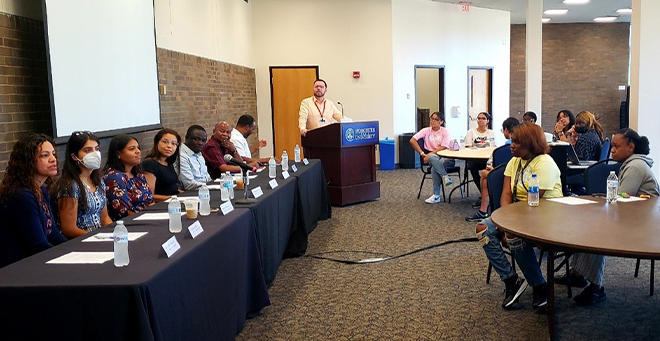
Photo: Adobe Stock
The first data-sharing project in Massachusetts to be used for community-based health intervention since the COVID-19 pandemic is expanding.
The Worcester Integrated Health Data Exchange, led by the City of Worcester and powered by UMass Chan Medical School, was initiated in 2024 to support the city’s public health response through a shared health data platform and focused on integrating opioid-related data from the Family Health Center of Worcester and UMass Memorial Health.
A $700,000, two-year extension of the program was finalized in July. With the renewal, this phase of the project will expand the platform to include maternal health equity as a new priority area and support the city’s new Maternal and Child Health Dashboard.
“This program will continue to be an incredible asset to the city, especially if we are able to bring together the other local health care organizations and contribute data into a single hyper-local data source, which will allow for public health decisions driven by data,” said Adrian H. Zai, MD, PhD, MPH, associate professor of population & quantitative health sciences and chief research informatics officer.
Dr. Zai and Matilde “Mattie” Castiel, MD, associate professor of medicine and Worcester commissioner of health and human services, presented findings from the first phase of the data exchange to the City of Worcester’s Board of Health in July. Dr. Castiel spearheads the data exchange project and emphasized the importance of data in public health and medicine, highlighting the platform’s role in raising awareness about community inequities.
“To have this platform and to be able to look at what’s happening in our city helps make people aware of inequities that exist in our communities, provides us with direction for outreach, and helps us work with different agencies so they can inform their clients and patients about what they’re seeing from the data,” Castiel said.
Castiel is retiring on Sept. 30 from her role as Worcester commissioner of health and human services. She will continue her work at UMass Chan. Tamara Lundi, the city’s public health director, and Nikki Nixon, deputy director of public health, will assume Castiel’s responsibilities in the data exchange program this fall.
“The extension of this data exchange represents more than technology,” Lundi said, “It represents our shared commitment to addressing deep-rooted health inequities in Worcester. We are committed to continuing this important work and ensuring that collaboration remains at the heart of how we advance health equity and improve outcomes for families across our city.”
Zai developed the platform for sharing deidentified patient data. He said high-level population data was gathered in the first phase, which provided real-time insights on the opioid use disorder population and gaps in hepatitis C and HIV treatment among those patients, and informed the focus on maternal health equity and infant mortality.
“We are prioritizing maternal health equity because we’re doing very poorly addressing the infant mortality rate in this state. It’s a big problem we need to address from a public health perspective, and to do that we need to collect more data,” Zai said.
According to the Massachusetts Health Policy Commission, the maternal morbidity rate for Black non-Hispanic pregnant people in the state is 2.5 times higher than for White non-Hispanic pregnant people.
In addition to maternal health equity, the scope of the date exchange over the next two years will expand to include a mobile app, extract EMS data from ambulance records and use AI to identify where the gaps in care are.
“This two-year extension is a precursor to start thinking about moving into an AI-enabled public health infrastructure. AI can drive interventions, streamline processes and identify priorities. You need well-curated data to do all of that, and this platform can provide it,” Zai said.
Castiel said she’s hopeful in time other health care agencies will come to the table and provide data to help further the platform’s ability to evolve in the future.
“This is the way we’re going to work together in Worcester. This is how community is going to know what’s going on. And I think this is an important way to change inequities in healthcare,” Castiel said.


